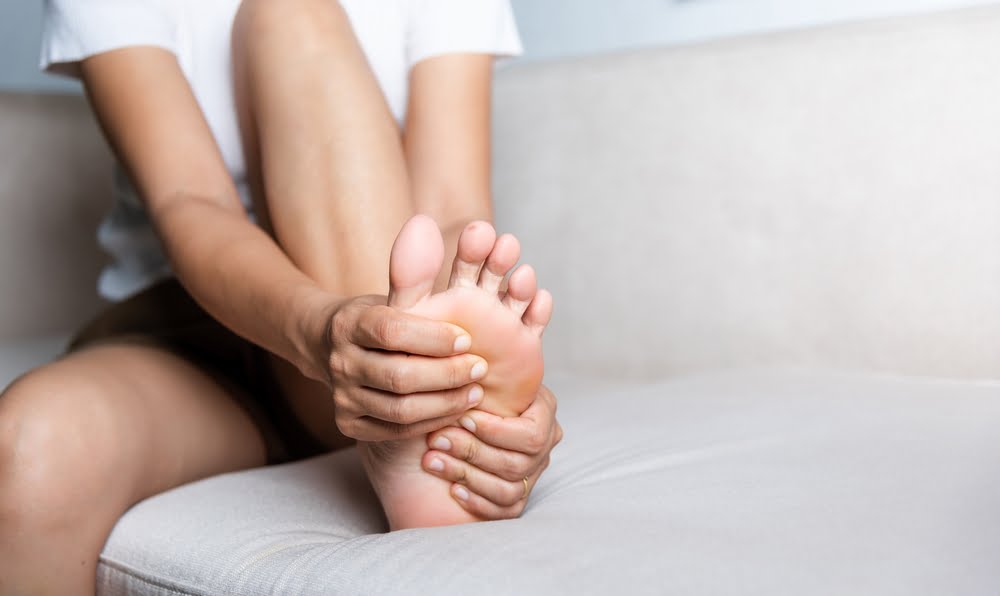Many people feel pain and numbness in their hands and feet, not knowing why. Peripheral neuropathy is a condition that affects your nerves. This article will show you what symptoms to watch for and how to handle them.
Keep reading to learn more about this invisible problem.
Understanding Peripheral Neuropathy
Understanding Peripheral Neuropathy involves grasping what it is and who it affects, as well as comprehending its causes. Symptoms and diagnosis also play a vital role in identifying and managing this condition.
What is it?
Peripheral neuropathy involves damage to the peripheral nerves. These nerves send signals between your brain, spinal cord, and the rest of your body. Damage here can disrupt these vital connections.
Imagine flipping a switch but the light doesn’t turn on; similarly, nerve damage can stop messages from getting through properly.
This condition often results in tingling and numbness, especially in hands and feet. People might also experience sharp, electric-like pain or a burning sensation that makes everyday activities challenging.
The symptoms can vary widely because the peripheral nervous system is extensive, affecting various parts of the body differently.
Who does it affect?
Diabetes, especially uncontrolled diabetes, stands as one of the leading factors contributing to peripheral neuropathy. It also affects individuals with nutritional deficiencies, autoimmune diseases like lupus or rheumatoid arthritis, and those undergoing chemotherapy.
Furthermore, people prone to pressure on nerves due to activities or trauma are at risk for this condition. Fibromyalgia patients experience symptoms akin to neuropathic pain due to central nervous system dysfunction.
People suffering from nerve damage in their legs and feet might also develop peripheral neuropathy. Sensory dysfunction often accompanies nerve pain caused by neurological disorders.
Causes
Nerve damage in legs and feet is often caused by underlying medical conditions such as diabetes, which can lead to peripheral neuropathy. Other causes may include infections, traumatic injuries, autoimmune diseases, and exposure to toxins or certain medications.
Additionally, vitamin deficiencies and hereditary factors can also contribute to the development of neuropathic symptoms.
Symptoms and Diagnosis
Symptoms of peripheral neuropathy can include shooting pain, electric-like sensations, sensitivity to touch, and loss of sensation in the affected areas. Diagnosing peripheral neuropathy involves conducting specific tests and procedures to identify nerve damage in the legs and feet.
Common Symptoms
Peripheral neuropathy can manifest in a variety of ways, such as shooting pain, electric-like sensations, and loss of sensation. Nerve damage in the legs and feet may cause sensitivity or tingling feelings.
Pain in the hands and feet is also common. These symptoms may vary depending on the individual and the underlying causes of peripheral neuropathy.
How to Diagnose
To diagnose peripheral neuropathy, doctors will perform a thorough physical examination and review the patient’s medical history. They may also conduct tests to evaluate nerve function and identify possible causes of the symptoms.
Additionally, diagnostic tests such as nerve conduction studies, electromyography, blood tests, and imaging scans like MRI or CT scans can help in confirming the diagnosis of peripheral neuropathy.
These procedures are essential in determining the extent and nature of the nerve damage which guides appropriate treatment decisions.
If you believe you are experiencing symptoms of peripheral neuropathy, consult with a healthcare provider who can recommend appropriate tests and procedures based on your specific situation.
Management and Treatment
To manage and treat peripheral neuropathy, doctors may prescribe medications to alleviate pain, however medications are not effective at treating the damaged nerves.
Understanding the management and treatment options is essential for a better quality of life when living with peripheral neuropathy. Read more about managing the symptoms effectively in our full article.
Available Treatment Options
The treatment we provide has four main goals…
- Optimize the environment within the body for nerve healing.
- Increase blood flow to the nerves.
- Stimulate the nerves that are damaged (small fiber, large diameter, or motor nerves) to reduce pain and improve balance.
- Decrease brain-based pain..
Additionally, making lifestyle changes such as maintaining a healthy diet, exercising regularly, and quitting smoking can also contribute to managing peripheral neuropathy.
Self-Care Tips
Engage in regular physical activity, such as walking or swimming, to improve circulation and relieve symptoms. Follow a balanced diet rich in fruits, vegetables, lean proteins, and healthy fats to support nerve health.
Manage stress through relaxation techniques like deep breathing exercises or mindfulness meditation. Inspect your feet daily for any cuts, sores, or blisters and keep them clean and moisturized.
Practice proper foot care by wearing comfortable shoes that fit well and protect your feet from injury.
Preventative Measures
Transitioning from self-care to preventative measures is crucial in managing peripheral neuropathy. Regular exercise, especially activities that improve balance and flexibility, can help reduce the risk of falls and injuries.
Monitoring blood sugar levels closely and maintaining a healthy diet are important steps in preventing further nerve damage. It’s also essential to avoid exposure to toxins such as heavy metals, chemicals, and certain medications that can exacerbate symptoms.
Making lifestyle adjustments like quitting smoking and limiting alcohol consumption can also contribute to preventing progression of peripheral neuropathy.
Living with Peripheral Neuropathy
Living with peripheral neuropathy requires consistent self-care and monitoring of symptoms. Seeking medical attention when experiencing new or worsening symptoms is crucial.
How to Take Care of Oneself
Engage in regular physical activity, such as walking or gentle yoga, to improve blood circulation and reduce symptoms of peripheral neuropathy. Monitor your blood sugar levels if you have diabetes, and follow a balanced diet rich in fruits, vegetables, and whole grains.
Inspect your feet daily for any cuts or sores, and wear well-fitting shoes to prevent injuries. Avoid smoking and limit alcohol consumption as these can worsen nerve damage symptoms.
Make sure to maintain good posture and use assistive devices if needed to prevent falls.
To relieve discomfort, consider using over-the-counter pain medications as directed by a healthcare professional. Explore relaxation techniques like deep breathing or meditation to manage stress that may exacerbate symptoms.
When to Seek Medical Attention
If you experience persistent or worsening symptoms such as tingling, numbness, or pain in your hands and feet despite self-care efforts, it is advisable to seek medical attention. Additionally, if you notice any unusual changes in your ability to walk or coordination due to nerve damage in legs and feet, seeking professional medical help is crucial.
A thorough evaluation by a healthcare provider can lead to an accurate diagnosis and tailored treatment plan that addresses your specific condition.
It’s not merely about recognizing the symptoms; it’s about taking proactive steps towards managing peripheral neuropathy effectively. Engaging with healthcare professionals when needed ensures timely intervention and support for improved quality of life.
Common Concerns and FAQs
Peripheral neuropathy can bring about various worries and questions. Many individuals wonder about the long-term outlook for their symptoms and if they will worsen over time. Some inquire about the best self-care practices to alleviate discomfort, while others are curious about specific activities that may aggravate their condition.
Additionally, there are often concerns regarding whether certain treatments or medications can effectively manage the symptoms without causing adverse side effects. Lastly, many seek clarity on potential triggers that could exacerbate peripheral neuropathy symptoms.
These frequently asked questions underline the importance of seeking guidance from a healthcare professional who can provide personalized advice tailored to each individual’s unique circumstances and needs.
Conclusion
Uncovering the Mystery of Peripheral Neuropathy Symptoms
Understanding and managing peripheral neuropathy can seem like a daunting task, but with the right knowledge and support, it’s possible to navigate this complex condition. Taking proactive steps towards self-care and seeking appropriate treatment not only enhances quality of life but also brings hope for those grappling with its impact.
As we delve into this realm, remember that while it poses challenges, there are strategies to unlock its secrets and robustly face the invisible pain it brings.
FAQs
What is peripheral neuropathy?
Peripheral neuropathy is a condition that causes pain, often described as electric-like, in the hands and feet due to nerve damage.
How do people know if they have symptoms of peripheral neuropathy?
If you feel pain like electric shocks in your hands and feet or experience unusual sensations, these could be signs of peripheral neuropathy.
Can doctors treat peripheral neuropathy?
Yes, there are treatments for peripheral neuropathy that aim to manage pain and address its underlying causes.
Why is it important to recognize symptoms early?
Recognizing symptoms early can help start treatment sooner, potentially easing the discomfort and preventing further nerve damage.





